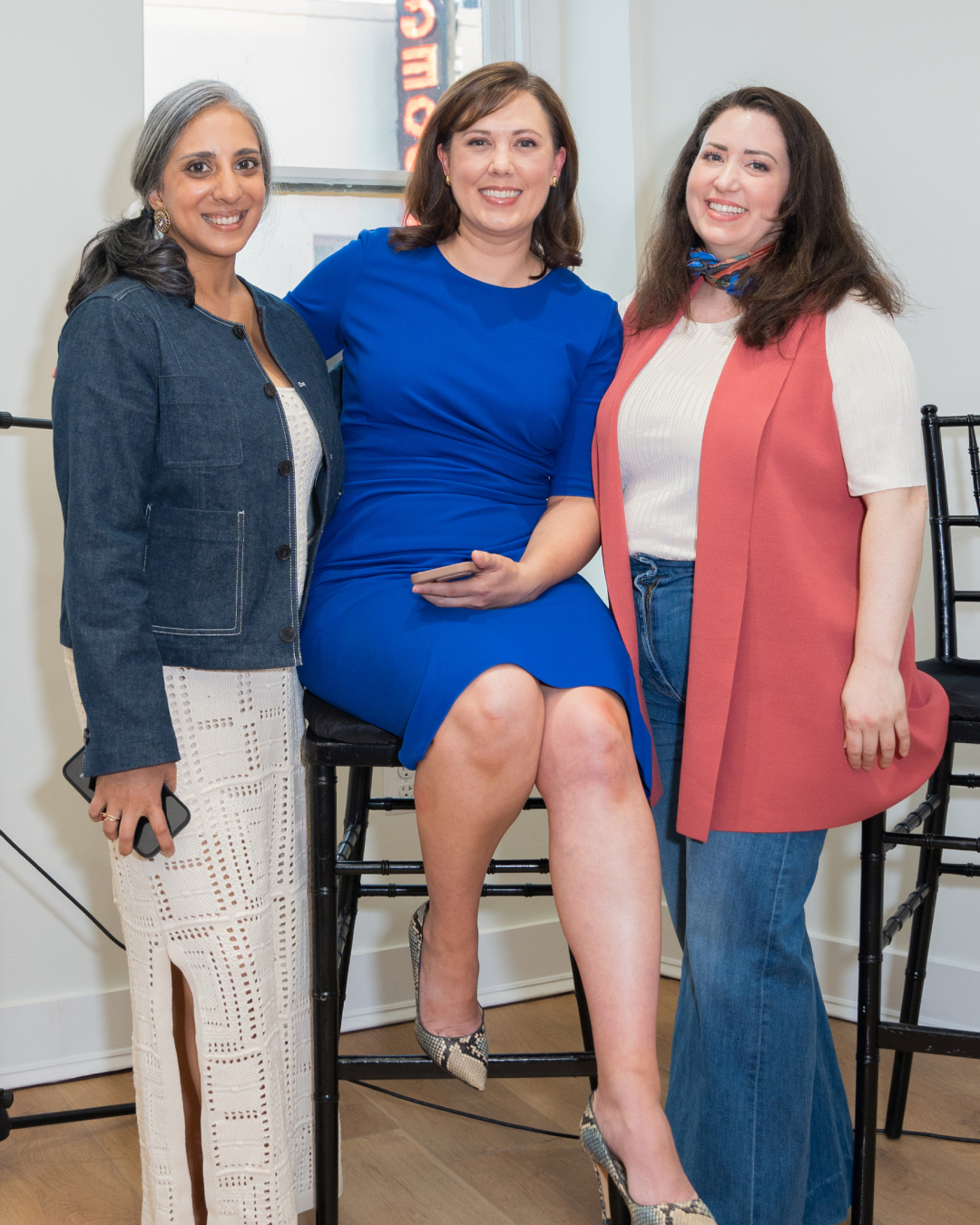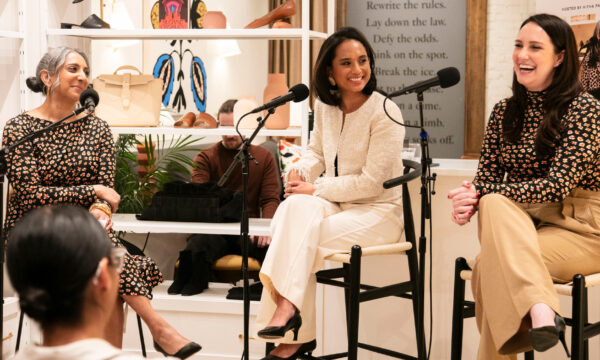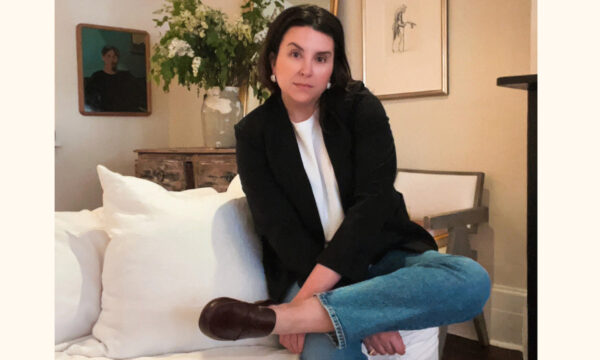
Shop This Look
Four Things We Learned About Making an Impact in Politics
In conversation with Hitha Palepu, Abra Belke and Emily Amick discuss everything from rethinking politics to which women of influence they dream of inviting to dinner.
To follow up our inaugural “Women Who Do” panel discussion, we hit the road and hosted the second installment at our new Georgetown store. Below, highlights from Hitha Palepu’s conversation with fellow multi-hyphenates and content creators Emily Amick and Abra Belke.
The below conversation has been edited for length and clarity. Thank you to @alchimieforever and @anfisaskin for partnering with us on this event.

Instagram: @hithapalepu
Newsletter: #5SmartReads
I’m the CEO of Rhoshan Pharmaceuticals, an author, a content creator, a romance novel-lover, and an ardent coffee drinker.
Instagram: @abrabelke
LinkedIn: Capitol Hill Style
I’m a proud Montanan, an attorney, a feminist, a blogger at Capitol Hill Style, and community manager at Thirtyish.
Instagram: @emilyinyourphone
LinkedIn: Emily in Your Phone
I’m an insurance coverage attorney, a former government staffer, a mother to a very rambunctious 21-month-old, and the author of Democracy in Retrograde.
Want more M Dash?
Sign up for our weekly newsletter.
Thank you!
1. Not everyone will support what you’re trying to build—and that’s okay.
Emily shared that she started her first public Instagram account after clashing with a superior. “I almost got kicked out of journalism school due to getting in a really aggressive fight with the head of the program about the Internet,” she said. “I was like, ‘I’m bored. I like the internet because it’s fast.’ Then, I met a bunch of people through my D.C. dog Instagram account, which was my first social-media based community and evolved into me posting political stuff, too. People got a lot more than pictures of my dogs. Eventually, I started Emily in Your Phone, which featured fact-based explainers for the first six months. People kept saying, ‘Maybe more opinions, less facts,’ so I was like, ‘Okie, dokes—let’s begin.’”
Abra also faced doubts when she was building Capitol Hill Style while serving in the Senate. “I remember the first time I ever posted an outfit photo from the ladies’ restroom outside the Senate in Montana,” she said. “Someone approached me and asked, ‘Did you just take a photo of that group?’ I was like, ‘Yeah, for my job.’ They go, ‘But I thought this was your job?’ I just told them I do both. I realized I was never going to be able to explain this to a bunch of old men, so I stopped trying.”


2. Impact comes in many forms.
For Emily, impact has been a long, winding, and fulfilling road. “I started my career making direct impact through representing victims of sex trafficking,” she shared. “My first job after law school was at a nonprofit in New York City called Sanctuary for Families. They provided legal services for domestic violence victims in the city, and I worked on the anti-trafficking initiative.
“Fast-forward to present day, and I’m getting Instagram DM’s—but I still find it deeply fulfilling. I get messages all the time that are like, ‘Because of you, I talked to my friend who didn’t vote, and she’s thinking about voting,’ or, ‘I never thought that I could be someone who would go to a school board meeting and speak up, but now I am.’ I might not be out there having direct political impact, but I think of myself as a force multiplier.”
Abra, too, reflected on her long and complex journey when it comes to impact, saying, “Making a meaningful impact is an ongoing challenge for me, because I’m a Republican feminist who believes in climate change. I was out of government for five years, went to law school, got into private practice, and one day, I read something about missing Indigenous people. A little girl had just gone missing three hours from my house, and I thought, ‘Okay, what’s the legislature going to do?’, because they were coming into session in 42 days. I called a couple of people I knew who worked in the state government, and they were like, ‘Yeah, I can’t really do anything.’ I asked if there were any jobs available, and there were. I said, ‘I’ll see you in 42 days.’
“It’s amazing how much impact you can have in a smaller context. That’s what I’ve been training people to do in Montana, because we’re not just losing our country or our state—we’re losing our communities due to political divisions that have nothing to do with these basic human issues. Luckily, I’ve met a lot of people who I really respect on both sides of the aisle. I’m the person you can call and say, ‘Here’s the thing that happened; who on the Republican side can we talk to?’ And the Republicans will call me and say, ‘Okay, which person on the Democrat side can we talk to?’ Facilitating those connections is one way I’m trying to make an impact.”

3. We have to fight for a new narrative.
Abra also weighed in on why women of influence still struggle to be taken seriously, saying, “Women have always had power, but now, we’re trying to have real power. That’s a problem for many people. When I worked on the Hill in 2004-2005, there were lots of female staffers who were the ones who knew everything, but because they were called ‘schedulers,’ they were not treated with any respect. Then, maybe in 2010, two or three of them got promoted to chiefs of staff and everyone was like, ‘Ugh, a scheduler?’ Now, I’m trying to get women to see themselves as a chief of staff from day oneThat’s the narrative I would like to write going forward. You don’t have to stand in the corner and pretend to be a cute little girl. You can just say, ‘Oh by the way, I’m a boss bitch.’”
Emily echoes this frustration, recalling a recent experience: “Last week, I had a phone call with a gentleman, and he told me, ‘You’re intense but competent.’ I was so fucking offended. I was like, ‘What do you mean ‘intense’? I’m a smart, competent woman; and yeah, I don’t pretend to be otherwise in front of men.’ And I feel like he used the word ‘intense’ just because they’re like, ‘Well, we can’t call you a cunt.’
“I think there are a lot of older men, especially in law, who grew up in institutions in which they were told that they were entitled to certain positions. We’re also seeing a version of this mentality with young men on the Internet today; there’s an entitlement to a certain lifestyle. As it turns out, women don’t necessarily want to provide that, and many people are very upset by that. I would like to fix that. I would like for men to understand that we are equal human beings who are not here on their behalf. I would like never to be asked to take dictation again. As someone with three graduate degrees, this has happened to me way too many times.”


4. The fresh perspective we need might come from the past—or even our undergarments.
When asked who her dream dinner companion would be, Abra went immediately to Jeannette Rankin. “I just want to ask her, ‘What made you bold enough to vote against World War II when no one else did? How did you do that, especially as a woman?’ I would also like to talk to Mike Mansfield, who’s the Senator for Montana. He was known for his quiet power. I feel like that’s not a skill that we teach anymore. I’m really focused on Montana right now, because I feel like we’re losing it. I grew up in Montana where you didn’t care what your neighbor was doing. My neighbors for my entire childhood were a lovely lesbian couple, and it just was never a thing that anyone cared about. Everybody was kind to each other for the most part, and we’re losing that to this idea that your neighbor’s life somehow affects yours all the time, and you must speak for or against their choices as well as your own. There are a lot of people who were active in Montana politics over the last 40 years, and I’d like to ask them, ‘How would you solve this problem?’”
As for Emily, she’s drawing inspiration not from the past but from unexpected places nonetheless. ”I would like to have Meredith from Wishbone Kitchen,” she says. “I really want that peach burrata summer salad that she makes. Also, I would go back to drinking and have a crisp summer white. I was thinking Ina and Martha should be there, too. That’s more about me though; not about solving any of America’s crises… If I’m thinking more politically, I would like to pitch Sara Blakely on applying what she did with Spanx to our democracy. Like, ‘How the fuck are all of us wearing Spanx—all of us right now?’ It’s a uniting force.”










